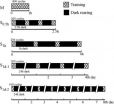(Press-News.org) Scientists and educators alike have long known that cramming is not an effective way to remember things. With their latest findings, researchers at the RIKEN Brain Science Institute in Japan, studying eye movement response in trained mice, have elucidated the neurological mechanism explaining why this is so. Published in the Journal of Neuroscience, their results suggest that protein synthesis in the cerebellum plays a key role in memory consolidation, shedding light on the fundamental neurological processes governing how we remember.
The "spacing effect", first discovered over a century ago, describes the observation that humans and animals are able to remember things more effectively if learning is distributed over a long period of time rather than performed all at once. The effect is believed to be closely connected to the process of memory consolidation, whereby short-term memories are stabilized into long-term ones, yet the underlying neural mechanism involved has long remained unclear.
To clarify this mechanism, the researchers developed a technique based around the phenomenon of horizontal optokinetic response (HOKR), a compensatory eye movement which can be used to quantify the effects of motor learning. Studying HOKR in mice, they found that the long-term effects of learning are strongly dependent on whether training is performed all at once ("massed training"), or in spaced intervals ("spaced training"): whereas gains incurred in massed training disappeared within 24 hours, those gained in spaced training were sustained longer (Fig. 1+2).
Earlier research suggested that this spacing effect is the product of the transfer of the memory trace from the flocculus, a cerebellar cortex region which connects to motor nuclei involved in eye movement, to another brain region known as the vestibular nuclei (Fig. 3). To verify this idea, the team administered local anesthetic to the flocculus and studied its effect on learning. While learning gains in mice that had undergone one hour of massed training were eliminated, those in mice that had undergone the same amount of training spaced out over a four hour period were unaffected.
Explaining this observation, the researchers found that the spacing effect was impaired when mice were infused with anisomycin and actinomycin D, antibiotics which inhibit protein synthesis. This final discovery suggests that proteins produced during training play a key role in the formation of long-term memories, providing for the first time a neurological explanation for the well-known benefits of spaced learning - as well as a great excuse to take more breaks.
INFORMATION:
A better way to remember
Memories are more likely to stick if learning includes regular periods of rest; now researchers think they know why
2011-06-19
ELSE PRESS RELEASES FROM THIS DATE:
Tapeworm drug inhibits colon cancer metastasis
2011-06-19
A compound that for about 60 years has been used as a drug against tapeworm infection is also apparently effective against colon cancer metastasis, as studies using mice have now shown. The compound silences a gene that triggers the formation of metastases in colon cancer. Professor Ulrike Stein (Experimental and Clinical Research Center, a joint cooperation between the Charité Medical Faculty and the Max Delbrück Center for Molecular Medicine, (MDC)) and her research group made this discovery in collaboration with Professor Robert H. Shoemaker of the National Cancer Institute ...
Phobos slips past Jupiter
2011-06-19
VIDEO:
A movie of the encounter made by combining 100 images of the June 1, 2011 Phobos–Jupiter conjunction. The High Resolution Stereo Camera on Mars Express took this sequence.
Click here for more information.
Earlier this month, ESA's Mars Express performed a special manoeuvre to observe an unusual alignment of Jupiter and the martian moon Phobos. The impressive images have now been processed into a movie of this rare event.
At the moment when Mars Express, Phobos, and ...
Low fertility in Europe -- is there still reason to worry?
2011-06-19
The post-war trend of falling birth rates has been reversed across Europe, according to a new study. However, despite an increasing emphasis on family and fertility policies in Europe, this recent development involves social, cultural and economic factors more than individual policy interventions.
For some decades, couples have been having children later in life. But birth-rates among younger women have stabilised and the long-term trend towards lower fertility rates has been reversed.
Politicians are still left to grapple with problems associated with an ageing population ...
IOF calls for improved strategies to close the treatment gap and reduce future burden of fractures
2011-06-19
It pays to prevent fractures. That's one of the main findings of a landmark report 'Osteoporosis – Burden, Healthcare provision and Opportunities in the European Union' newly published in the journal Archives of Osteoporosis. The study, compiled by the International Osteoporosis Foundation (IOF) in collaboration with the European Federation of the Pharmaceutical Industries and Associations (EFPIA), calculates the future burden of fractures as a consequence of increasing treatment uptake in the five largest European countries as well as Sweden.
Fragility fractures, which ...
US Medicaid drug lists cost more, deliver less
2011-06-19
The U.S. Medicaid program is likely paying far more than necessary for medications and not offering patients the most effective ones available, by ignoring international evidence-based lists of safe and effective medications, according to a new study by researchers at University of California, San Francisco.
The study, which compared the Medicaid program's Preferred Drug Lists in 40 states nationwide against the World Health Organization's 2009 Essential Medicines List, found that the medications that are automatically paid for by the state-run Medicaid programs vary ...
University of Louisville surgeons perform first prosthetic bypass graft with patient's stem cells at point-of-care
2011-06-19
LOUISVILLE, Ky. – The first three patients to undergo an investigational surgical procedure for peripheral vascular disease that involves the patient's own stem cells continue to do well, reports the University of Louisville surgeon who is the principal investigator.
The "TGI-PVG IDE" clinical trial initiated at UofL involves using a patient's own stem cells to line man-made bypass grafts to better the chances at saving the limbs of patients with peripheral artery disease. Charles B. Ross, M.D., chief of the Division of Vascular Surgery and Endovascular Therapeutics, ...
NASA's James Webb Space Telescope completes first round of cryogenic mirror test
2011-06-19
The first six of 18 segments that will form NASA's James Webb Space Telescope's primary mirror for space observations completed final cryogenic testing this week. The ten week test series included two tests cycles where the mirrors were chilled down to -379 degrees Fahrenheit, then back to ambient temperature to ensure the mirrors respond as expected to the extreme temperatures of space.
A second set of six mirror assemblies will arrive at Marshall in late July to begin testing, and the final set of six will arrive in the fall.
The X-ray and Cryogenic Facility at NASA's ...
How Long Do Breast Implants Last?
2011-06-19
When you are considering breast augmentation it is common to wonder how long the implants will last. Stories abound about leaking implants and implant ruptures, causing some women to seriously consider if this procedure is safe and long lasting. It is important to remember that no medical device can last a lifetime. Like all medical devices, breast implants can, over time, wear down and require replacement.
Why Breast Implants Fail
A majority of breast implants last for ten to 25 years. Some women may enjoy a longer lifespan and others may have to replace their breast ...
System 92E looking more like a developing east Pacific tropical storm
2011-06-19
A low pressure area in the Eastern Pacific Ocean, located off the western coast of Mexico, is still getting organized, and System 92E and the Tropical Rainfall Measuring Mission (TRMM) satellite spotted heavy rain and strong thunderstorms within.
On Friday, June 17, 2011, System 92E appeared on satellite imagery as a broad area of low pressure that contained showers and thunderstorms. System 92E was located several hundred miles south of the Gulf of Tehuantepec. The gulf is a large area at 16 North and 95 West, which is right where the low pressure area is centered. Many ...
Despite Protocols, Wrong-Site Surgeries Persist
2011-06-19
In an effort to prevent wrong-site and wrong-patient surgeries, the Joint Commission developed the Universal Protocol in 2004. The protocol introduced a series of steps -- preprocedure verification, site marking, and a time out prior to beginning the procedure -- to ensure the correct surgery was being performed on the right person.
New research is finding that despite the introduction of the Universal Protocol, operations performed on the wrong person or wrong body part continue to happen at an alarming level.
Colorado Study
In a study published in the Archives ...
LAST 30 PRESS RELEASES:
National Reactor Innovation Center opens Molten Salt Thermophysical Examination Capability at INL
International Progressive MS Alliance awards €6.9 million to three studies researching therapies to address common symptoms of progressive MS
Can your soil’s color predict its health?
Biochar nanomaterials could transform medicine, energy, and climate solutions
Turning waste into power: scientists convert discarded phone batteries and industrial lignin into high-performance sodium battery materials
PhD student maps mysterious upper atmosphere of Uranus for the first time
Idaho National Laboratory to accelerate nuclear energy deployment with NVIDIA AI through the Genesis Mission
Blood test could help guide treatment decisions in germ cell tumors
New ‘scimitar-crested’ Spinosaurus species discovered in the central Sahara
“Cyborg” pancreatic organoids can monitor the maturation of islet cells
Technique to extract concepts from AI models can help steer and monitor model outputs
Study clarifies the cancer genome in domestic cats
Crested Spinosaurus fossil was aquatic, but lived 1,000 kilometers from the Tethys Sea
MULTI-evolve: Rapid evolution of complex multi-mutant proteins
A new method to steer AI output uncovers vulnerabilities and potential improvements
Why some objects in space look like snowmen
Flickering glacial climate may have shaped early human evolution
First AHA/ACC acute pulmonary embolism guideline: prompt diagnosis and treatment are key
Could “cyborg” transplants replace pancreatic tissue damaged by diabetes?
Hearing a molecule’s solo performance
Justice after trauma? Race, red tape keep sexual assault victims from compensation
Columbia researchers awarded ARPA-H funding to speed diagnosis of lymphatic disorders
James R. Downing, MD, to step down as president and CEO of St. Jude Children’s Research Hospital in late 2026
A remote-controlled CAR-T for safer immunotherapy
UT College of Veterinary Medicine dean elected Fellow of the American Academy of Microbiology
AERA selects 34 exemplary scholars as 2026 Fellows
Similar kinases play distinct roles in the brain
New research takes first step toward advance warnings of space weather
Scientists unlock a massive new ‘color palette’ for biomedical research by synthesizing non-natural amino acids
Brain cells drive endurance gains after exercise
[Press-News.org] A better way to rememberMemories are more likely to stick if learning includes regular periods of rest; now researchers think they know why



